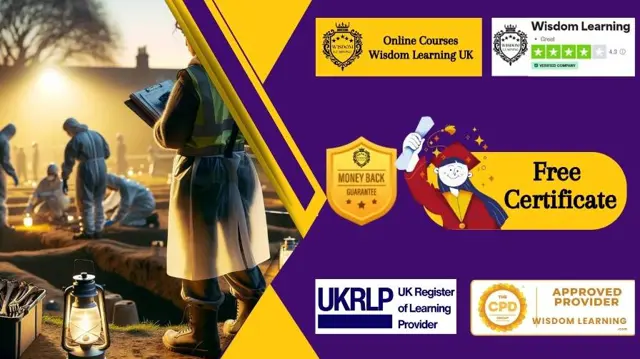
Forensic Anthropology
UKRLP & CPD approved provider | Easy Refund | Free e-Certificate | Instant Access | Tutor Support |
Wisdom Learning Limited
Summary
- Reed Courses Certificate of Completion - Free
- Tutor is available to students
Add to basket or enquire
Overview
Forensic Anthropology
Delve into the intricate world of forensic anthropology with our comprehensive forensic anthropology course. Explore the historical development and pivotal role of forensic anthropology in criminal investigations, tailored specifically to the UK context. Gain expertise in human osteology, mastering the identification of major bones and landmarks, and understanding bone development. Learn essential techniques for skeletal analysis, including sex, age, and stature estimation. Navigate through the complexities of skeletal pathology, trauma identification, and decomposition stages. Understand legal protocols and ethical considerations, and apply your knowledge to real-world case studies. Elevate your expertise and contribute to the realm of Forensic Anthropology.
Key Features- Forensic Anthropology
This Forensic Anthropology includes the following offers:
- Forensic Anthropology - Instant Free Certificates
- Self-paced learning
- 24/7 Support
Enrol on our Forensic Anthropology course to gain a comprehensive understanding of Forensic Anthropology.
Curriculum
Course media
Description
Forensic Anthropology Learning Outcomes:
Upon completing this Forensic Anthropology course, participants will:
Understand the scope and significance of forensic anthropology: Gain insights into the definition, historical development, and role of forensic anthropology in criminal investigations, particularly within the UK context.
Develop proficiency in human osteology: acquire a comprehensive understanding of human skeletal anatomy, including the identification of major bones, landmarks, bone development, growth, and ageing.
Master skeletal analysis techniques: Learn methods for estimating sex, age, and stature from skeletal remains while comprehending the variability and limitations inherent in these estimations through practical exercises.
Identify skeletal pathology and trauma: recognise common skeletal pathologies, differentiate between various types of trauma, and understand the implications of injuries sustained before, during, and after death.
Comprehend decomposition and taphonomy: Understand the stages of decomposition, factors influencing decomposition in the UK climate, and taphonomic changes affecting skeletal remains, which are crucial for estimating the postmortem interval.
Navigate legal and ethical considerations: gain knowledge of the chain of custody, evidence preservation, the role of forensic anthropologists in court proceedings, and adhere to ethical standards governing professional practice.
Apply forensic anthropology techniques to real-world cases. Analyse UK-based case studies, solve crimes through the application of forensic anthropology principles.
How This Forensic Anthropology Course Can Help (UK)
Enhanced Crime Investigation: Equips law enforcement professionals with the knowledge and skills necessary to effectively analyse skeletal remains, aiding in the identification of victims and perpetrators in criminal cases.
Improved Victim Identification: Enables forensic practitioners to accurately estimate characteristics such as sex, age, and stature from skeletal remains, facilitating the identification of missing persons and providing closure to families.
Legal Expertise: Provides professionals with an understanding of legal procedures, evidence preservation, and courtroom protocols, enabling them to testify confidently as expert witnesses in legal proceedings.
Ethical Practice: Instills ethical principles and professional standards in forensic practitioners, ensuring the integrity and reliability of forensic evidence and promoting accountability within the criminal justice system.
Forensic Anthropology Certificate
Upon completing the Forensic Anthropology Course, you will receive an instant Forensic Anthropology certificate from Reed.
Who is this course for?
Forensic Anthropology
This Forensic Anthropology course is ideal for individuals interested in pursuing careers in forensic science, law enforcement, anthropology, or related fields. It is suitable for undergraduate and postgraduate students seeking to specialise in forensic anthropology, as well as professionals already working in law enforcement agencies, forensic laboratories, or academic institutions who wish to enhance their expertise in skeletal analysis and forensic investigations.
Requirements
Forensic Anthropology
- Learners with no prior Forensic Anthropology knowledge may enrol in this Forensic Anthropology course.
- This Forensic Anthropology course has no requirements.
Career path
Forensic Anthropology
FORENSIC ANTHROPOLOGY training offers a unique opportunity to gain valuable skills and advance your career
Questions and answers
Currently there are no Q&As for this course. Be the first to ask a question.
Certificates
Reed Courses Certificate of Completion
Digital certificate - Included
Will be downloadable when all lectures have been completed.
Reviews
Currently there are no reviews for this course. Be the first to leave a review.
Legal information
This course is advertised on reed.co.uk by the Course Provider, whose terms and conditions apply. Purchases are made directly from the Course Provider, and as such, content and materials are supplied by the Course Provider directly. Reed is acting as agent and not reseller in relation to this course. Reed's only responsibility is to facilitate your payment for the course. It is your responsibility to review and agree to the Course Provider's terms and conditions and satisfy yourself as to the suitability of the course you intend to purchase. Reed will not have any responsibility for the content of the course and/or associated materials.


